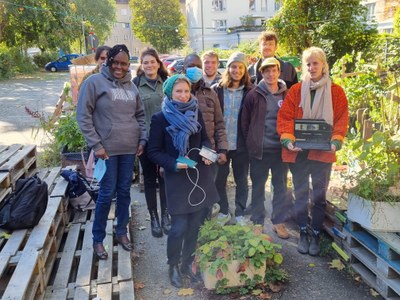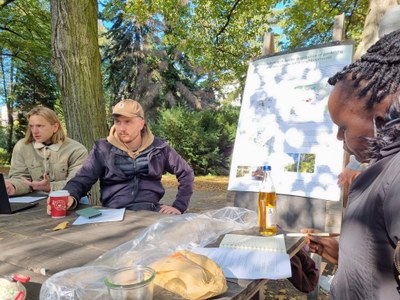Study Project 2021
November 2021
Together with Master students from Geography, Agricultural and Horticultural Sciences from Humboldt-Universität zu Berlin and Technische Universität Berlin (TU) as well as EAGER scholars from all partnering Univeristies in Kenya and Tanzania, a joint study project on Urban Agriculture in Berlin, Nairobi and Daressalaam was carried out from April until October 2021.

From the German side it was led by Prof. Sabine Fuss and Dipl.-Geogr. Maria Velte (lecturer, both from Geography Department, HU). From the Kenyan side Dr. Makau Kitata (lecturer at Department of Literature, UoN) and Ms Rebecca N. Karaya-Kigwa (Tutorial fellow with teaching duties at the Department of Agricultural Sciences at KARU) and from the Tanzanian side Ms. Neema A. Munuo (Assistant Research Fellow with teaching duties at ARDHI) and Dr. Nestory E. Yamungu (lecturer in the Department of Geography at UDSM) completed the team. Urban agriculture is at the core of a sustainable development agenda (see Nicholls et al. 2020). In the Global South, food security is a prime goal with shortened transportation routes, reduction of post-harvest losses, and responsible consumption and production being important elements (Sheahan/ Barrett 2017). In the Global North, the focus shifts more towards strengthening links between the city and nature, promoting social cohesion and fostering health (see a.o. Dobele/ Zvirbule 2020; Pinheiro/ Govind 2020; Tornaghi 2014). In the face of climate change, urban agriculture can be an adaptation strategy. To understand and analyze urban agriculture projects and programs, it was first of all important to develop theoretical concepts and frameworks. The literature spanning the field of urban agriculture relies on many different framings and conceptual definitions. In a first block, an introduction provided the background to the various concepts and approaches in the Global South and North. In discussions and working groups a common understanding and frame of analysis for the rest of the course was developed. In the second block, some case studies were be introduced for the city of Berlin, Dar es Salaam and Nairobi. In group discussions participants reflected on how this related to what was framed in the previous blocks and whether regional heterogeneity with respect to objectives, design and outcomes weas seen. Afterwards, teams adopted cases, for which they did some first research - visiting the sites, documenting first insights for all course members and presenting and discussing the cases in class. Together, it was worked out how the cases map onto the framings developed in the first block. The presentations already resulted in ideas for the project work. Further possible research questions were developed in class in the third block. The fourth block provided a set of tools to tackle these research questions, including review techniques, qualitative methods based on interviews, remote sensing approaches, etc. Based on the first four blocks, the project teams developed their research designs and presented their projects in class. Mutual feedback between groups was encouraged, as it is a very good learning experience to scrutinize each other’s research design. Subsequently, each project team will wrote a short expose, on the basis of which the project was be carried out. From 11.-13.10.2021 results of the study projects were presented in the "Workshop on Urban Agriculture in Berlin, Nairobi and Dar es Salaam".
Faculty: Maria Velte, Sabine Fuss, Makau Kitata, Rebecca Karaya, Neema Munuo (remotely), Nestory Yamungu (remotely)

Contact: eager.trans-net@hu-berlin.de
